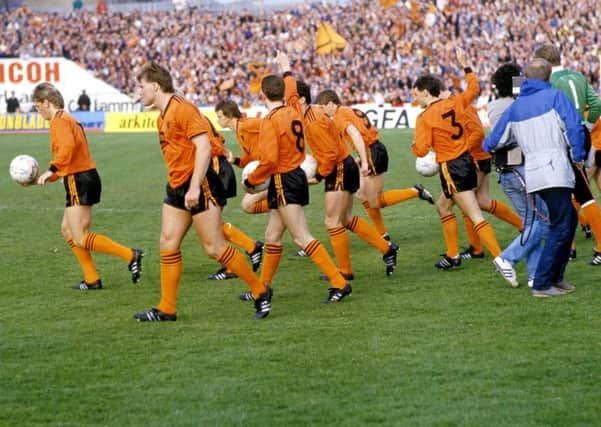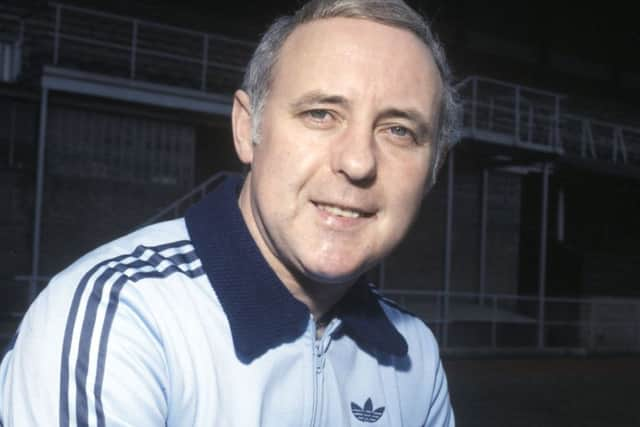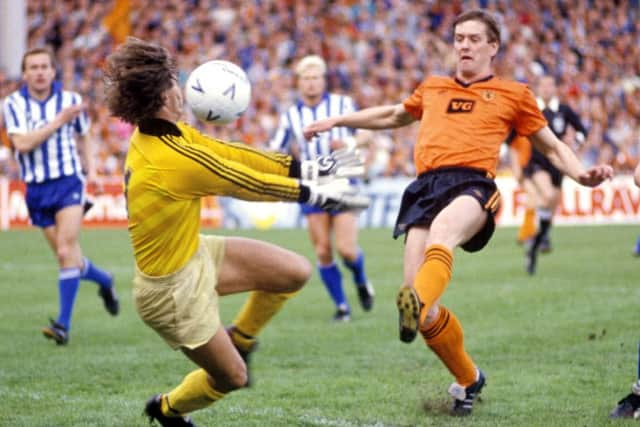Alan Pattullo: Jim McLean, Dundee United and the Uefa Cup final


What a divisive, inspirational, fascinating figure he could be. McLean used to tell Doris, his wife, that because he didn’t go out when United had suffered a defeat, he couldn’t go out when they won. And this being McLean, the hardest of taskmasters, a draw wasn’t much to get excited about, so there was no point getting the gladrags on then either.
In short, Doris can’t recall many dinner dates with her teetotal husband – at least not between August and May.
Advertisement
Hide AdAdvertisement
Hide AdDoris has since joked that the closest the McLeans came to having a Saturday night out was the ritual where her husband would settle down for a post-match debrief with Johnstone Grant, the then Dundee United chairman and fellow Broughty Ferry resident.


They were close, geographically as well as emotionally. But would chat on the phone, sometimes for over an hour. The chairman with a drink by his side, McLean, naturally, without, as they pored over the details of the game just played, the relentless manager working out ways to improve.
“Jim was a perfectionist as a manager,” says Willie McLean, his older brother. “He was looking for perfection every time. But that’s not possible in football. It is a competitive game. Sometimes you have to hold your hand up and say: ‘they were better than us today’. But not as far as Jim was concerned, he only saw one team – the good, the bad and the ugly. The other team did not exist.
“Jim was always fighting against the corner shop image of Dundee United,” he continues. “He always had a chip on his shoulder. Nothing was good enough for him. No matter what stage he was at, he wanted to be better.
“He was a very unsatisfied guy at times. I used to say: ‘J, any other manager would love to be in your situation, where you and Fergie are the New Firm and putting a fight up against the other two. Can you not be satisfied with that?’ He always had to try for the next step.”


With McLean in the grip of this Dundee United obsession, the angelic Doris was left to bring up sons Colin and Gary, often on her own. It’s something McLean himself has since acknowledged, including in a post-retirement interview with this newspaper in 2002, when he revealed how much he now enjoyed driving Colin to work each morning.
“It takes five minutes but that’s five minutes more than I ever spent with him when I was a manager,” he lamented.
But Doris was no soft touch. She wouldn’t allow her husband to get away with much else. When she lost her engagement ring in Gothenburg, resulting in a full scale, albeit fruitless, cushions-on-the-floor search of their hotel, with local Swedish Polis down on hands and knees as well, she demanded her husband purchase a new one on their return. This simply compounded McLean’s hurt following the 1-0 first-leg loss to IFK Gothenburg, 30 years ago today.
Advertisement
Hide AdAdvertisement
Hide AdThe anniversary of these games – the second leg was on 20 May, 1987 – is why interest in Dundee United’s exploits, and McLean in particular, has been stirred anew. But articles such as this one, and a new documentary chronicling United’s epic, 70-match 1986-87 season being premiered in Dundee on Tuesday, lack McLean’s input because he is now in poor health, and has been for some time.


One of his last visits to Tannadice was in 2011 for the opening of the Jim McLean Fair Play Stand, a structure initially built with a financial award from Fifa for the sporting behaviour of the Dundee United fans after losing 2-1 on aggregate to Gothenburg.
On anniversaries such as this one, when the great deeds of past United teams are placed beneath the spotlight once more, McLean’s absence from the fray is more markedly felt.
While his Wikipedia entry claimed McLean turned 80 last month, he isn’t due to reach this milestone until August. But, with a ninth decade beckoning and considering he has not managed since 1993, it’s remarkable his influence remains so strong.
Nearly a year ago, sitting in a café in Paris on the day Northern Ireland played Wales in Euro 2016, I almost fell off my seat when, while discussing former Dundee United player Michael O’Neill’s coaching methods, and the Northern Irish approach to that afternoon’s game, his assistant Austin MacPhee commented, matter-of-factly: “Of course it all comes back to McLean.”


McLean?
“Jim McLean. It all comes back to Jim McLean,” stressed MacPhee, who has also worked with other Tannadice graduates such as Billy McKinlay and John Holt.
“They were all traumatised by him!” MacPhee continued. “But they respected the information. I can see it in little things, like Michael will say to Kyle [Lafferty] and Josh [Magennis]: ‘When I was at United, [Kevin] Gallacher ran in behind and I came to the ball. Or ‘when the full-back is low come to the ball, and when he’s high, run down the side of him’.”
So at an international tournament three decades after McLean’s pomp, his views were still being ingested. To get to Paris via Gothenburg and a lot of other places, Barcelona included, besides, we must go a long way back to the past – to Ashgill, a small enclave of miners’ houses serving two pits in Lanarkshire, where the McLean family grew up.
Advertisement
Hide AdAdvertisement
Hide AdWillie McLean, now a sprightly 82, can still picture the scene as he sits in the living room of his home on the Ayrshire coast, where the view – the isle of Arran as opposed to bings – is more bucolic. But the McLeans’ circumstances were better than many at the time.
“By the time we – myself, Jim and Tommy – came along there were four streets of council housing, and we had a council house,” recalls Willie. “The miners’ houses… oh dear. It was all old miners, standing on street corners between shifts smoking their fags, drinking a pint of beer. That was the environment.”
While expected to share the work ethic of miners, the McLean brothers had to forgo beer and fags. Their grandfather, William Yule, gave up a promising career with Rangers to join the Plymouth Brethren – not another football club, but a strict religious sect.
In order to have Yule’s daughter Annie’s hand in marriage, Thomas McLean, who had signed provisionally for Hearts, had to join the same church, which meant sacrificing football as well, because playing organised sport wasn’t permitted.
So how all three McLean sons came to be footballers despite this background is the first miracle in a story containing a few more – including Tommy playing in a European final with Rangers, Jim leading Dundee United to one, and to the brink of another.
Willie describes his own career, where he played for clubs such as Raith Rovers and Queen of the South, later managing them as well as Motherwell, as “ordinary” by comparison. But it’s proposed by some, Craig Brown among them, that the elder McLean was once rated the more promising manager.
“Jim used to phone me at Motherwell and ask: ‘what did you do at training the day?’” recalls Willie. “I’d tell him what we did training-wise. The wee bandit must have been writing it all down. Of course, when I asked him what he had done that morning, he’d be like: ‘Oh nothing much, we did not have a good day’.
“He was always very, very guarded,” adds Willie. “We were competitive. Our mother used to go crazy: ‘you two don’t tell each other anything!’ I fought Jim’s battles when he was a wee boy.”
Advertisement
Hide AdAdvertisement
Hide AdWhen Motherwell thumped United 4-1 at Tannadice in January 1976, Willie was forced to assume the role of protective older brother again. Jim, who had already been in charge for five years after taking over in December 1971, was struggling.
“Let’s be honest, when Jim went to Dundee United, it didn’t all happen overnight,” recalls Willie. “I remember I was manager of Motherwell and after we beat United at Tannadice he got absolute hell. He and I were walking down the track together and the crowd were giving him dog’s abuse – absolute dog’s abuse!
“I ended up fighting with all these gabaloonies who were giving him stick. And my team has just won 4-1! They were all pointing at Jim: ‘you don’t know what you’re doing’.”
‘You have to get the position of these dugouts changed,’ I told him. Of course he didn’t. I think he enjoyed the conflict!”
McLean drew on experiences such as this and blended faithful old pros like Archie Knox and Walter Smith with talented youngsters, while also introducing a bonus system that meant players, whose basic salary might have been modest, were rewarded for getting results.
A potent brew of factors combined to turn Dundee United into one of the finest sides in Europe for a spell, though there were casualties along the way, including those who couldn’t cope with McLean’s strict regime, combustible temper and seeming inability to offer praise.
“Some players just could not handle the criticism,” recalls Willie. “Others took it as a challenge. He was looking for guys who could take the stick and come back.
“He wanted strong characters, who could stand up against 20,000 supporters and not give a toss. Others were hindered by the stick they got. To be fair he got those strong characters.”
Advertisement
Hide AdAdvertisement
Hide AdOne of them was Paul Hegarty, who played in the Ullevi stadium 30 years ago, and whose career owed a lot to an inspirational decision made by Jim McLean.
“I was at Queen of the South at the time,” recalls Willie. “Jim would phone me before he signed a player. He asked me about Paul, who was then a striker at Accies. They were in the Second Division along with us. I said: ‘he will get you goals! He is very good in the air’.
“Christ, the next thing I know he’s playing centre-half!
“Jim said: ‘Aye, he will never be a centre-forward – but he will be a good centre-half. I don’t want him to heid the ball into the goal, I want him to heid it out!’”
Hegarty was one of the mainstays, though he has since noted he grew no closer to Jim McLean because of that. “Hamish [McAlpine], [David] Narey, [Paul] Sturrock and Hegarty – that was the soul of the team,” recalls Willie.
With this celebrated quartet in place, United won the League Cup in 1979, retained it at Dens against Dundee the following year before winning the Scottish league title in 1983 – again at Dens against Dundee, where McLean had endured a difficult time as a player.
These successes saw him coveted by Rangers in the Autumn of 1983. In his book, 1987’s Jousting with Giants, McLean summed up his choice as “knife my brother or knife the chairman”.
Tommy was already at Rangers as assistant manager. Jim knew Tommy would likely be considered surplus to requirements if he didn’t accept the offer to head to Ibrox.
Loyal, possibly to a fault, Jim remained at Tannadice, where tangerine ties trumped blood ones.
Advertisement
Hide AdAdvertisement
Hide AdAccording to Willie, there was an additional force keeping him on Tayside – a love for his adopted city (he was awarded the freedom of Dundee in 1993).
“Jim never really ever wanted to go back to the west of Scotland,” he says. “I don’t know why. When he went to Dundee he became a Dundonian. Dundee was god’s country as far as he was concerned at that point. That’s why Wattie [Walter Smith, his assistant] and him fell out.
“Jim had agreed to go to Rangers at one point. But Johnstone Grant convinced him to stay. But Wattie said: ‘I am still going’. So he ended up going later with [Graeme] Souness.
“They fell out but they fell back in again. But Jim was not pleased Wattie had jumped ship. For a wee while he had the hump with him. But he would tell you if he had the hump with you! So Wattie will have known. We used to work together with the SFA down at Largs on the coaching courses and he’d be like: ‘what about that bloody brother of yours!’
Indeed, what about him? He’s only, for both good and bad reasons, perhaps the most fascinating figure to emerge from Scottish football in the last 40 years – and that includes his old pal and rival Alex Ferguson. On anniversaries like this one, and with the current side finding it such a struggle to escape the past, Jim McLean deserves to be cherished.